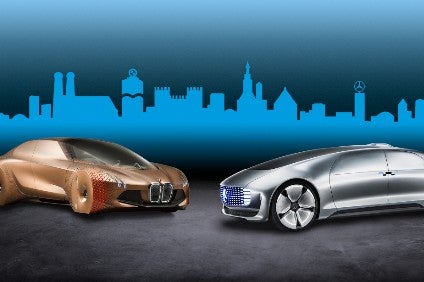BMW Group and Mercedes-Benz are putting their cooperation on development of next-generation technology for automated driving temporarily on hold. Following extensive review, the two companies say they have arrived at a 'mutual and amicable agreement to concentrate on their existing development paths – which may also include working with current or new partners'.
The two companies cited the cost of developing a new next generation shared autonomous drive technology platform, as well as current business and economic conditions, as reasons for putting the cooperation on hold. They also both made it clear that they want to stay strategically flexible as they view the post-Covid future, with all its uncertainties.
BMW stressed its existing technology success working with partners like Intel, Mobileye, FCA and Ansys. Indeed, the company suggested its 'robust modular system' puts it in a position to offer customers what they need for 'many years'. No hurry, then.
Looking to the future, Mercedes said that in order to prepare for a rapidly changing environment, we are currently 'sounding out other possibilities with partners outside the automotive sector'. Who might they be and how advanced are the soundings? We don't know, but the coronavirus' impact on the business landscape makes the spectrum of market outcomes much wider than pre-crisis. In these circumstances companies want to be agile and able to detect new trends quickly, working with the right partners. Over the past ten years, they – and their key suppliers – have had to work with companies outside the traditional automotive supplier eco-system. Agility and flexibility will be key to identifying key trends and new partnerships.
Let's not forget, also, that BMW and Mercedes-Benz are great business rivals. They have a good record of cooperation in Germany when there are similarly shared interests – in industry standards, for example – but where those shared interests may lay in the wake of the Covid crisis is perhaps less certain. Autonomous drive and its implementation may eventually turn out to be the great brand differentiator, and my guess is that engineering teams at the two companies may not have relished sharing hard won engineering innovations with a major rival.
And it looked like a costly and difficult path, anyway. Fully autonomous driving is also devilishly difficult (and expensive) and Level 4 and Level 5 vehicles don't look like having a commercial solution in the next few years. Road and traffic experiences are neither finite or stable. Without a costly array of built-in technological redundancies to reduce risk to near zero they appear a non-starter at the moment.
Moreover, the COVID-19 pandemic has created more immediate priorities – like a healthy balance sheet – for automotive companies facing depleted demand and lost sales. It has also generated new uncertainties for timelines in closely related fields – both in terms of related tech and business models – such as carsharing.
For now, BMW and Mercedes will continue with their separate current generation advanced driving assistance systems (ADAS) technologies and shelve the more ambitious collaboration – while not completely closing the door on returning to it at a later date. They will also keep options open to work with others outside the traditional automotive eco-system as the industry and transportation space is transformed.
The COVID-19 crisis is forcing re-evaluations of company priorities and strategies, especially future investment commitments. For many in the industry, the huge sums involved in some advanced technologies – such as automated drive – are simply not justifiable in current market conditions.
The new focus for car companies is on core activity, on surviving and being competitive for the 'new normal' conditions ahead. As far as longer-term strategic goals go, every company faces unique circumstances in the grand post-Covid reset.







